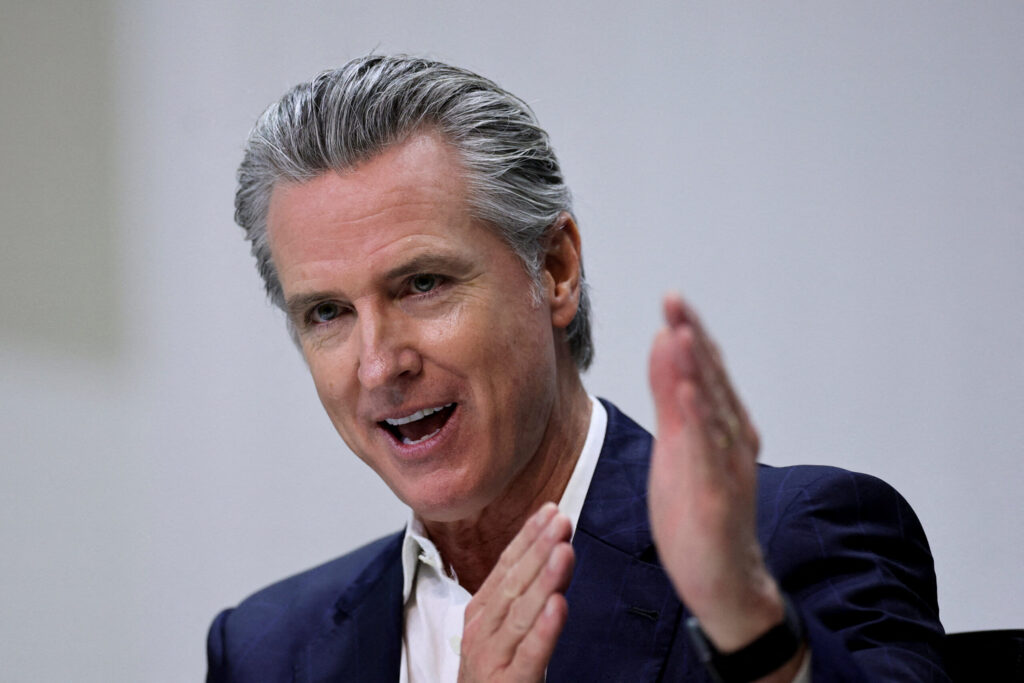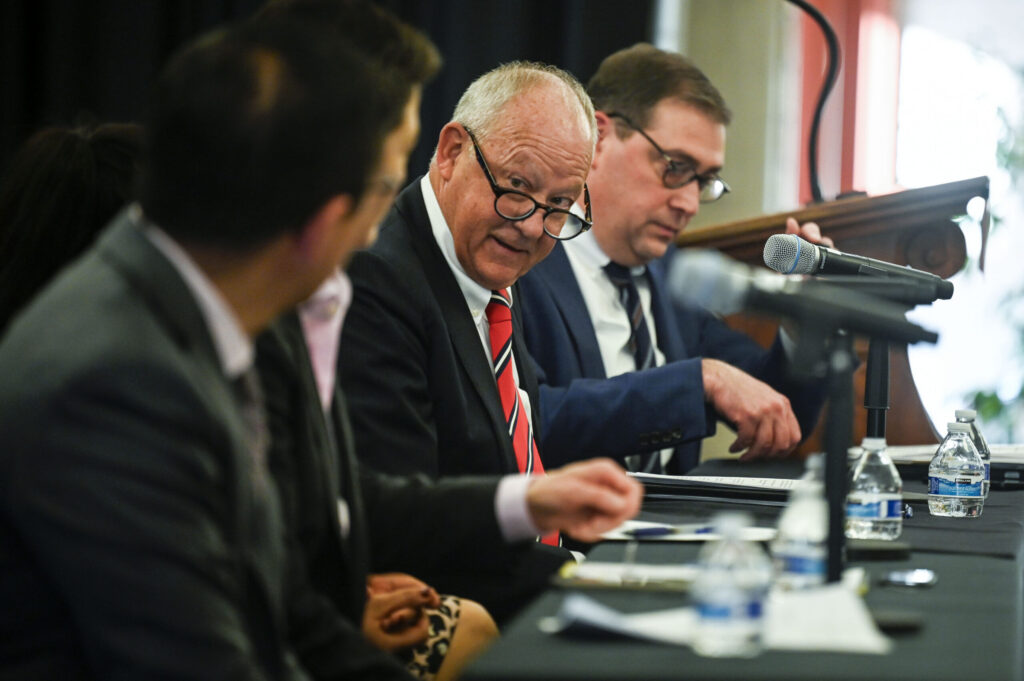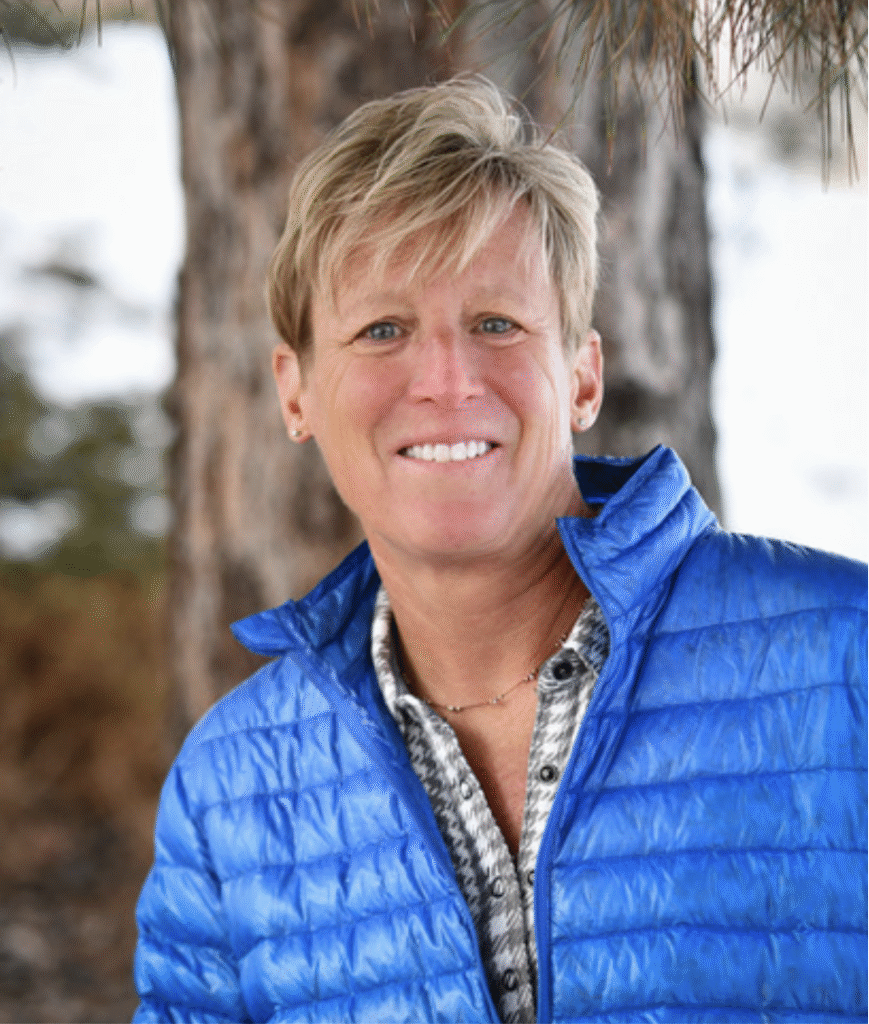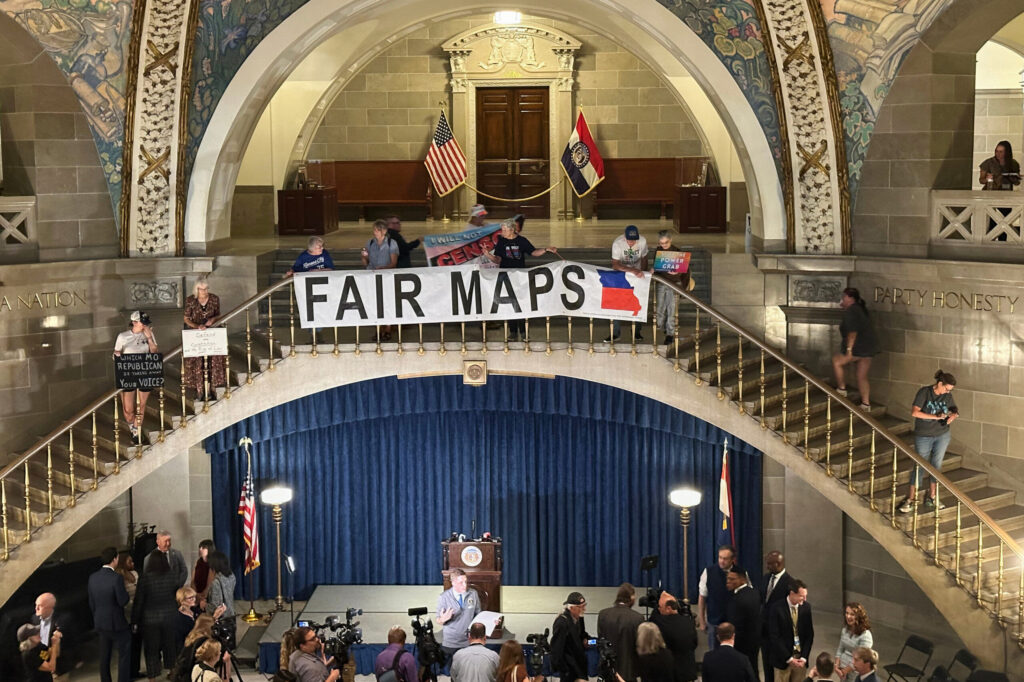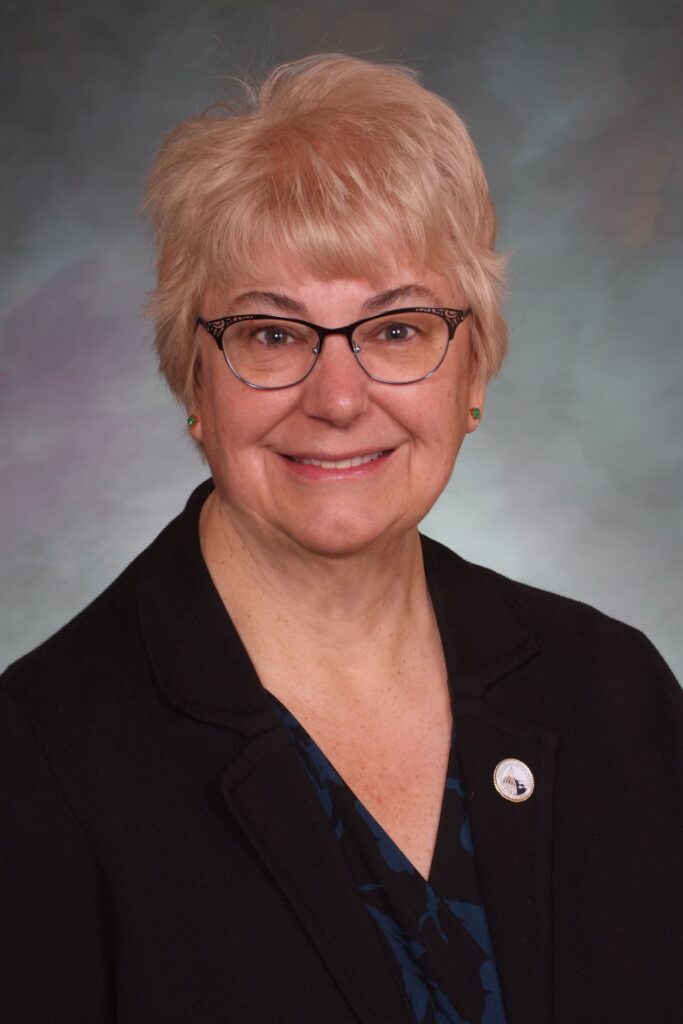Colorado Bar Assn. lobbyist Jeremy Schupbach: ‘In many cases, the law is my client’
Although he tracks nearly every bill in front of the Legislature, lobbyist Jeremy Schupbach often won’t weigh in on contentious policy questions or what he describes as “thorny” issues at the state Capitol. But when it comes to commas, he’s often all over it.
Schupbach has what he calls his favorite job in the whole world, director of legislative relations for the Colorado Bar Association.
“It’s fun to lobby at the Capitol, but to be in so many worlds, everything from animal law to water law, and trying to get lawyers engaged and get them to pay attention to everything, it’s like herding 18,000 cats,” Schupbach says with a chuckle.
With the help of Amy Redfern of Aponte Public Affairs, Inc., the association’s contract lobbyist, Schupbach is the face of the Bar at the Capitol during the legislative session, running bills and keeping track of them for the association’s 18,000 members.
The Bar Association’s lawyers are divided into 27 sections – covering everything from agricultural law to workers compensation law – and it’s Schupbach’s responsibility to check in with them all to see if anyone has an interest in pending legislation. The sections that cover trusts and estates law, business law and real estate law account for the most traffic under the dome, he notes, because a good share of each session’s legislation involve those legal areas.
“More lawmakers have business bills, and our business section tends to be more united about what bills would be good,” he says. “A good example of a section that is not always so aligned is real estate. They work together fantastically as a section, they’re on top of their game all the time. But when it comes to an issue like construction defects, that section has lawyers on both sides of different cases. So if I bring a construction defects bill package, I can pretty much guarantee I’ll get a lot of opinions on it, but I won’t get, ‘The Bar should do this.'”
But that’s where the commas are important.
“We enjoy a really unique position at the Capitol,” Schupbach says. “I’m not the guy who will take a position on construction defects – that’s a really good example. But I can tell you when we look at your bill, ‘This may work,’ or, ‘This may not work.’ So I’ll come to a legislator, I’ll go to both parties and say, ‘Can we structure it this way? Can we do it that way?’ Or a legislator will come to me with ideas, ‘Does this work?’ And I’ll say, ‘You can do it better.’ We do a lot of the technical commentary on bills for both sides of the aisle because we don’t pick partisan sides, we don’t pick ideological sides. We do more of the boring cleanup.”
Working with lawmakers, he says, making a bill work can come down to punctuation placement.
“‘You can put a comma here, but if you put it here, it’ll actually change the meaning of the sentence,’ I’ll say. I’ve actually lobbied commas before. Ironically, it’s that level of detail that my guys care more and more about – the unintended consequences of a bill. We understand what they’re trying to get at, but there are areas we’re always looking to improve. ‘But if you do it this way, it’s going to hurt these other areas, and we need to protect these other areas and figure out a solution to this first.'”
It isn’t just the commas, of course.
“It’s not unusual for the Bar Association, because we’re really good at the legal aspect of things, to take a look at things we’re more or less indifferent to and try to get changes where we’ll try to improve the process,” he says. “‘If you write Section D this way, there will be unintended consequences, and we’ll have to come back later and fix it. But if you write Section D this way, you’ll not only solve your problem, but you’re also going to help things down the road instead of accidentally blowing things up.'”
It’s a unique position at the Capitol, representing a group of clients who often have fiercely opposed views on many of the issues in front of lawmakers but who are united in wanting the entire process to work.
“In many cases, it’s more like the law is my client,” Schupbach says.
Take, for instance, the criminal law section, whose 18-member council – the advisory group that Schupbach interacts with almost daily during session and frequently the rest of the year – is evenly divided between prosecutors, judges and defense attorneys.
“I can pretty much guarantee that when I bring a bill, for instance a sentencing bill, I’m going to get six people in favor of it and six people opposed to it and six people,” he trails off, shrugging. “We don’t weigh in on a lot of issues like that. What does the bar think about DUI penalties or juvenile sentences or things like that? It’s harder for the Bar to come to a position on issues like that because I represent an association of people with varied opinions.”
Those groups of attorneys – the trial lawyers, for instance – have their own lobbyists at the Capitol and, while Schupbach is in constant communication with those colleagues, he says he doesn’t worry too much about the positions they take on legislation.
The same is true for lawmakers when it comes to many of their bills.
“I’ll let them know that this is what half of the lawyers think, this is what the other half of them think, but we’re not going to weigh in on it,” he says.
Much of Schupbach’s job involves keeping in touch with lawyers across their specialties, letting them know about potential legislation, as well as gathering the information they come across in their communities and then sharing that at the Capitol and with other Bar Association members.
” And that starts the dialogue,” he says. “My position is to be the liaison between the Capitol and the sections, make sure there’s communication. And then when we do take a position, it’s up to Amy and I to go over there and make it happen.”
Once the session is under way, he says, his daily schedule often goes out the window and it’s a mile a minute until the 120 days are over.
“The session is really kind of a rodeo,” he smiles. “I keep a picture of trying to stay on a bull up in the corner there to remind myself what it’s like,” he adds, pointing to a photograph on the wall in his office. “You can try to stay on for the eight seconds it feels like – except when it feels like 10 years.”
Like most lobbyists, he’ll tap his phone when asked where he spends most of his time during the session. “My office is my iPhone,” he says with a grin, though he adds that he’ll sometimes borrow a conference room across the street at the offices of contract lobbyist Aponte Public Affairs.
“I always want my lawyers to feel like they’re the most informed people on anything that happens at the Capitol,” Schupbach says. “I pride myself on that communication, so that if they have questions, if they have comments on bills, I want them to be able to come to me.”
The Illinois native, who landed in Colorado more than a dozen years ago – after earning a degree from the University of Minnesota, he lived for a time in Duluth, but it turned out to be “the coldest place on the earth,” so he headed west – is preparing for his third session of the General Assembly working for the Bar Association, which represents 18,000 Colorado lawyers. Before that, he was legislative liaison for Alliance Colorado, an advocacy organization representing people with developmental disabilities, for nine years, and before that he worked as medical services board coordinator, working on Medicaid and related issues for the state.
Working for the Alliance, he says, he learned how the state budget works. “I learned the power of the Joint Budget Committee,” he says, shaking his head and then nodding. “‘Follow the money,’ and you’ll find out what the issue is. So following the JBC is probably the fastest way to find out what’s going on in Colorado, because everything has implications in the budget.”
Still, much of his work at the Capitol is above that fray, involved in the nitty-gritty of the precise wording of a business bill, or one that outlines procedures for estates and trusts, for instance.
“Those are the areas where the nature of the law is not so political drive,” he says. “It’s hard to find a business bill that has an ideology in it. Real estate is real estate. We have some fun fights over it, but everyone gets the need for a decent recording system, because it’s so document-driven. That’s one we feel more comfortable and confident and frequently weigh in on because it’s so procedurally driven and there’s such a legal history behind it.”
“We really are very protective of laws in that area,” he continues. “We work very hard to make sure that if there’s a rough spot, especially in probate, or if there’s an opportunity to make things easier for the people we work with, we work very hard to do that. We work hard to make sure the laws that are passed are good laws that work well.”
Sometimes a section of the Bar Association will be in agreement on more contentious legislation, he notes, though most often not because of a bill’s policy implications.
“Last session there was the fracking and earthquakes bill sponsored by state Rep. Joe Salazar,” Schupbach recalls. “The natural resources section was pretty much in lockstep. You have lawyers on both sides of the issue – oil and gas and environmental lawyers – but everybody pretty much took a look at that and said because of the legal way it flipped the burden of proof, regardless of the policy of fracking, they said that’s not the way you want to address that.”
He stresses that, although plenty of lawyers have strong opinions about a topic – and many of them wind up in court on both sides – it’s the underlying structure of the law that draws the Bar Association and Schupbach’s attention.
“I’ll be hard-pressed to ever take a position on construction defects,” he says, “because, while the Legislature may get a win and they may get a bill, I can’t even begin to guarantee you that 40 percent of my lawyers would be happy with an outcome. Why would I weigh in on that? Now, if it says something like you can’t build in Colorado, period, or that you can’t sue anybody over building in Colorado – it does more than pick a side, it upsets the whole concept of the legal underpinning, then, yeah.”
Schupbach returns to Salazar’s fracking bill, which passed the Democratic-controlled House but died in a Republican-controlled Senate committee, as an example.
“That’s why we weighed in on the fracking bill. It isn’t because we care about fracking, though I have lawyers who care about fracking,” he says. “But the way the bill was structured and the way it changed some of the legal structure about what you could and couldn’t do, the burden of proof and all that, we weighed in more for a protection of the law as an entity.”
Pointing out that the controversy predates his arrival at his current job, Schupbach notes that the Bar Association several years ago also opposed so-called “personhood” bills that sought to redefine the legal definition of a person to include fertilized embryos.
“From my understanding, part of the reason we opposed those bills and amendments was the change to roughly 20,000 places in the Colorado code where it changes the definition of ‘person,’ and the unintended consequences,” he says. “We were opposing the bill not on philosophical grounds but because there’s a lot of places in the law where the definition occurs. If a case like that came up again where it blanket changes the definition of something, it would be hard for me to think we wouldn’t weigh in, even if it was a little bit controversial.” He added, “The last thing I want to do on any issue like that is try to pick sides. I represent lawyers in Colorado, I don’t represent factions of lawyers in Colorado.”
While membership in the Colorado Bar Association is voluntary – practicing Colorado lawyers must belong to any one of more than 20 bar associations, including regional groups across the state – it’s the largest and most influential of the state’s bar associations. Consequently, numerous lawmakers who are also lawyers belong, including state Rep. Yeulin Willet, who is on the Bar Association’s board of governors, and outgoing state Sen. Ellen Roberts, who was on the trust and estate section’s council. State Rep. Dan Pabon, state Sen.-elect Bob Gardner and term-limited state Sen. Pat Steadman, as well, have done a lot of work with the Bar Association.
“I work with them like any other legislator, but there is some connection,” Schupbach says. “Because of their legal background, they understand some of what I’m trying to accomplish – they understand why we’re trying to move a comma, for instance.”
But there are fewer lawyers in the Legislature these days, and when the new General Assembly takes office in January, there will be fewer still.
“Historically, we’ve had about 20 legislators who are lawyers, but it’s at 15 now, and after the election it’ll be closer to 10 or 12,” Schupbach says. “It’s dropped from historic norms, and that’s a little concerning for the Bar. It’s actually also a nationwide trend. Some bar associations are putting together programs to recruit lawyers to run for the Legislature,” he said, noting that the Colorado Bar Association isn’t among them.
As for the rules he’s learned for effective lobbying at the Capitol, Schupbach says that’s an easy answer.
“It’s all relationships. Everything hinges on the quality of your relationships,” he says. “Nothing is more important to me, especially representing the Bar, than my integrity, to say something, to mean something, to stand behind it. I’ve actually waited outside a committee meeting where I had no business for two, three hours, just so I could wait for a lawmaker or fellow lobbyist and say, ‘What I said earlier? I’m going to have to fix that.’ Because there’s nothing more important than your credibility.”
It comes down to trust, Schupbach says.
“They have to be able to trust me, and I have to be able to trust them,” he says. “There isn’t a day when I don’t walk into the building thinking about how my reputation, how the Bar Association’s reputation is going to play and make sure when I email my lawyers and ask, ‘What’s my position on this?’ that they know I’m looking to say, ‘How can I improve Colorado law?’ And it’s my job to translate that for the legislators.”


